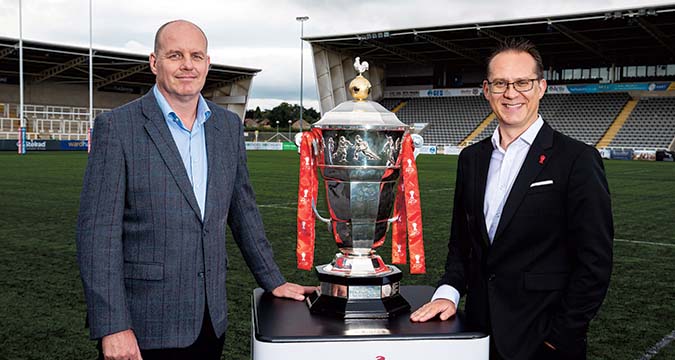
Jon Dutton has never shied away from next year’s World Cup having big and bold targets.
750,000 ticket sales during the month-long tournament is a daunting aim, while delivering a competition that will earn worldwide headlines is another major goal.
But the largest of Dutton’s goals is delivering what competitions before this one have all failed to deliver, which is to create a Rugby League legacy.
Time and time again Rugby League has failed to capitalise on opportunities to grow the game.
But Dutton’s goal is to ensure Rugby League has no choice but to build once the competition is over.
When the World Cup came to the UK in 2013 it was considered a major success, but the lasting legacy of the tournament is harder to identify.
Dutton, the Chief Executive planning next year’s tournament, is determined to make sure the same won’t be said of 2021.
“Our job isn’t to simply focus on eighty-minute games,” he said.
“The difference between 2013 and this competition is that we have a chance to deliver a legacy programme. Legacy for us is about right here and right now.
“If you think back to Bristol in 2013 and the USA being there, it was great, but we didn’t have the resource and time to capitalise on that event.
“We have that now and if we don’t leave a footprint at the end of the competition we won’t have achieved our goal.”
That played its part in the thinking behind the location of the training bases for nations once they arrive for the competitions. Last week, the World Cup announced where all 18 nations that will compete in the men’s, women’s and wheelchair tournaments will be based during the event.
A combination of heartland areas and less prominent Rugby League areas will host the game’s superstars.
From Leeds to Middlesbrough, St Helens to Coventry, personalities from across the world of sport, including Manchester United footballer Jesse Lingard and golfer Lee Westwood, helped reveal all.
“We put a great deal of thought into it,” said Dutton.
“We have 18 towns and cities hosting national teams. Everyone stuck their hands up and wanted particular teams and we had an idea in mind for some of the nations too. Given the African-Caribbean community in Leeds and the great work Alex Simmons has done with the England Knights, that was a logical fit. Scotland being placed in Newcastle was another; their games in Workington, and that amazing result against New Zealand are remembered fondly, so that was a natural fit.
“There are other links too the story of the Cook Islands and the famous captain, James Cook, who was born in the area, meant that we took the Cook Islands to the Tees Valley.
“What we are hoping is many will support England but adopt a second nation. With Tonga being in Liverpool and St Helens, there is that attachment with Kristian Woolf.”
Middlesbrough was perhaps the most eye-catching announcement, given the lack of a Rugby League presence in the area.
“We wouldn’t have gone to Middlesbrough if we didn’t genuinely believe we can make a difference,” said Dutton.
“We know we can’t afford to wait until the teams arrive; it has to start right here.
“We’ve got the ability to do that. We know how accessible players are and for a place like Middlesbrough that will be hugely beneficial. To have community visits, open training sessions, school engagement is all about celebrating the culture and this history, but also about giving Rugby League a platform.”
